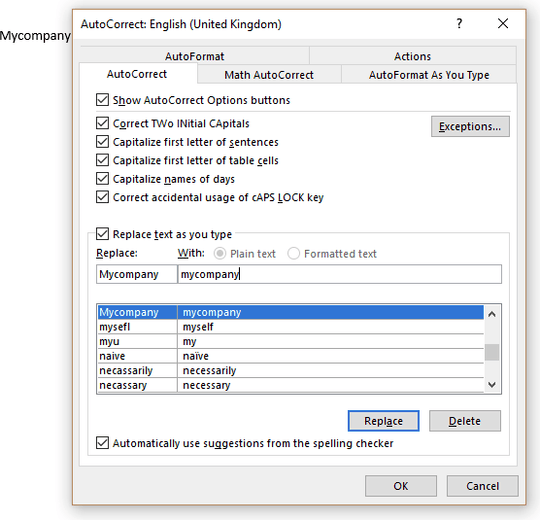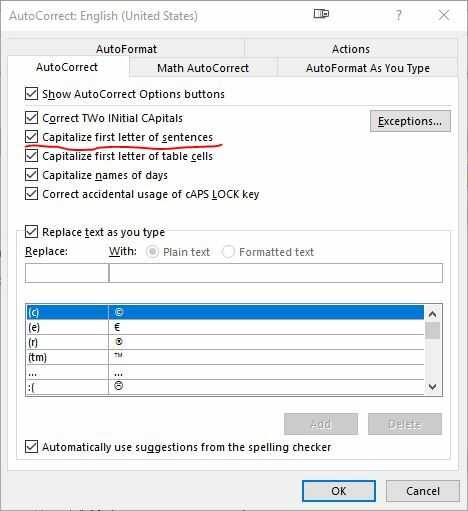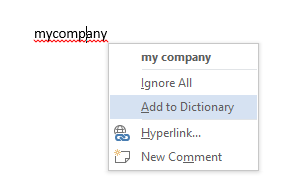33
2
I work for a growing online company that recently re-branded itself as "mycompany" (not its real name but the real name has all lower case, no space between words). I am trying to find a way to force Microsoft Word to never auto-capitalize the name "mycompany", whether it is at the beginning of a document, paragraph, or sentence. I am having no luck so far.
I reviewed the documentation related to AutoCorrect and I know that there appears to be a way to prevent Microsoft Word from auto-capitalizing "mycompany" at the beginning of a sentence by going to Options → Proofing → Autocorrect → Exceptions....
However, when I add "mycompany" into the "Other Corrections" tab and say "Don't Correct", Microsoft Word continues to do so by capitalizing the "M". It's extremely frustrating.
I invite you to try it. Go to Options → Proofing → AutoCorrect → Other Corrections → Don't Correct, enter "mycompany", and then test it out in a document. Microsoft Word continues to automatically capitalize "mycompany" at the beginning of documents, paragraphs, and sentences, although I've specifically told it to NOT auto-correct!
Is this a bug in Microsoft Word or am I configuring something wrong?



I get the same results. Report it to Microsoft. – Xalorous – 2016-09-30T12:09:00.507
19
For what it's worth, the Wikipedia Style Guide has this to say about trademarks that begin with a lowercase: 1) They should be capitalized anyway since they are a proper name; except 2) if it begins with an initial lower followed by an uppercase; and 3) Rephrase so that the word does not begin your sentence or paragraph.
– GalacticCowboy – 2016-09-30T15:24:28.96328As a side-note: Lack of capitalization where capitalization is due leads to slower and awkward reading (not to mention inconsistencies between your own and other third party texts). In my opinion, weird spelling rules for trademarks deliberately worsen the communication – Hagen von Eitzen – 2016-09-30T20:17:14.310
After some testing, this appears to be a bug in Microsoft Word. I am using the latest version of Office and the most current available build of Windows 10 (Anniversary Update), and when I choose 'Stop Auto-Capitalizing first Letter of Sentences', it does just that. – delete me – 2016-10-01T11:35:43.960
Having a lower-cased word begin a sentence simply looks wrong. It looks like a grade school kid wrote it. I don't know what advantage you gain by associating your company name with an internationally recognized mistake. I mean, foreign people who read it will immediately point to it as a mistake. – Nelson – 2016-10-03T06:48:09.683